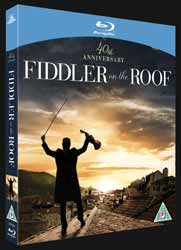|
Click here to return to the main site. Blu-ray Review
In the Tsarist Russia 1905 things look bleak for the Jewish community of Anatevka, their lives are as precarious as a fiddler on the roof. The only thing which keep the community going is their adherence to tradition. Tevye, works hard as a farmer, but doesn’t seem to be able to enrich himself. Worse still he has three daughters, none of which are willing to wait for the matchmaker to choose husbands for them and have three men in mind. Marriage to any of the three would break with tradition... Fiddler on the Roof (1971 - 3 hrs, 01 min, 07 sec) is a film adaptation of the most popular musical stage show (1964), until Grease stole that particular crown. The show’s music was composed by Jerry Bock, with Sheldon Harnick lyrics and a story by Joseph Stein. The film version was directed by Norman Jewison and went on to win many Oscars, BAFTA’s and Golden Globes. Although it remains one of my favourite musicals, looking at it now, dispassionately, I’m not really sure why, as the storyline is weak. Once you get past the initial set up, the film revolves around each girl presenting her marital choice to her father, who then wrings his hands in angst and goes off to talk to God. Once the marriages are out of the way the village is subject to a pogrom and split up, well so much for tradition saving you from a cruel world. What makes the film so special is the central performance by Topol as Tevye, who spends his time talking to both God and the audience about the tribulations of his life. He imbues the character with a great deal of sympathy, even if his objection to his daughter marrying a non-Jew borders on racism. The show also has some very strong songs for a Broadway show, the highlights are undoubtedly ‘If I Were a Rich Man’ and ‘Sunrise, Sunset’, although the rest of the score is just as strong. Like West Side Story and South Pacific, Fiddler is able to mix sentimentality with an ending which is less than happy, making it feel more like the operatic style of Madam Butterfly than its competing contemporary shows. For me, this represents, quite possibly, the pinnacle of this particular art form. Directorially, Jewison frees the dance sequences from their stage-bound originals, putting the audience around and within the dancers, allowing a feeling of engagement, difficult to achieve on a stage. Its transfer to Blu-ray has garnered it some real improvements, not least of which is the English DTS-HD 7.1 audio track, there are also a number of other European tracks, which are either DD 5.1 or DD 2.0. The disc comes with English subtitles as well as subs for a further fourteen languages. For extras you get a full length commentary with Norma Jewison and Topol, which has some good insights about transferring the show from stage to screen. Norman Jewison, Filmmaker (49 min, 33 sec) is standard def and rather grainy, but is well worth a look if you’re interested in the director and his work. Norman Jewison Looks Back, is further broken down into smaller, more directed piece. We have On Directing, Strongest Memory, Biggest Challenge and On Casting, all the pieces are only a couple of minutes long. Tevye’s Dream in Full Colour (5 min, 56 sec), which was shown in black and white, here you have the original film as well as a side by side comparison of the sequence. John Williams: Creating a Musical Tradition (11 min, 32 sec) has Williams talking about conducting the music for the film. Songs of Fiddler on the Roof (14 min, 43 sec) takes a look at how the original songs came about. Next up is a song which was recorded for the film, but found its way to the cutting room floor ‘Any Day Now'. No film remains, so the song is played, accompanied by a series of stills. Tevye’s Daughters (16 min, 28 sec) takes a look at the casting of Tzeitel (Rosalind Harris), Chava (Neva Small) and Hodel (Michèle Marsh), with contributions from the original actresses. Set in Reality Production Design (9 min, 50 sec) is a small piece discussing how the sets and costumes lead to a realistic look to the film. The disc is finished off with a collection of teasers, trailers and TV spots. Visually the film has improved, though there are the occasional flecks of dirt and a touch of edge enhancement. The film is presented in its original aspect ratio of 2.35:1. Whilst it is not the best film ever made, it is certainly one of the most successful transfers from stage to film, for a show which was loved by both the critics and audience alike. The extras are in keeping with the show's stature and overall it makes a nice package. 8 Charles Packer |
|---|

